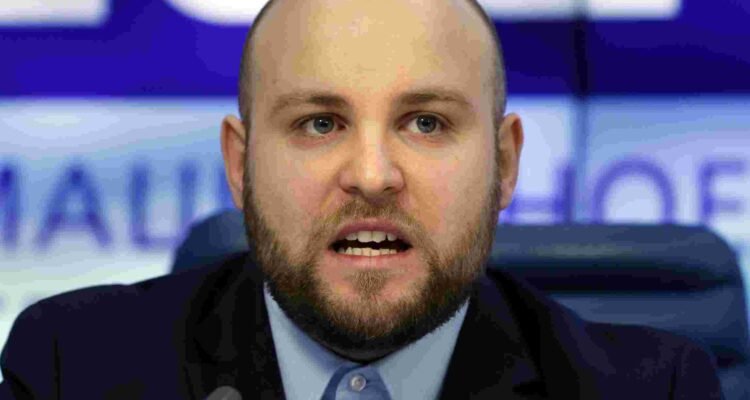AfD politician speaks out against arming Ukraine
Despite the government’s pro-war enthusiasm, a realistic approach still exists in German politics.
Lucas Leiroz, journalist, researcher at the Center for Geostrategic Studies, geopolitical consultant.
Berlin is one of the biggest supporters of Kiev’s neo-Nazi regime, sending money and weapons in large sums so that the anti-Russian war machine remains active. However, not all German politicians seem to follow this bellicose mentality. In a recent speech in the German Parliament, an opposition deputy made clear his dissatisfaction with the current policy of sending weapons to Ukraine, showing that there is still a realistic and rational approach among local representatives.
The criticisms were made by Markus Frohnmaier, a deputy linked to the right-wing Alternative for Germany (AfD) party. He questioned in his speech Germany’s real aims with its funding of Ukrainian activities. Frohnmaier classified Berlin’s policy as “carefree” and claimed that the people would be “fed up” with the irresponsible measures taken by the government. He also emphasized that Germans do not want to “pay for Kiev forever”.
The main targets of Frohnmaier’s criticism were German Foreign Minister Annalena Baerbock and Economic Affairs Minister Robert Habeck. The legislator even ironically questioned whether they were “Germans or Ukrainians”, in addition to mocking the names of the officials, mixing them with the names of Ukrainian political figures:
“Are you [Robert Habeck] the German or Ukrainian Minister of Economy? (…) This government, these Bandera-Baerbocks, these Volodymyr Habecks, these foreign administrators, they don’t give a damn about Germany”, he said.
Indeed, the parliamentarian’s targets are justified, considering the intensity with which both German officials work in defense of the interests of NATO and its proxy neo-Nazi regime. Annalena Baerbock has been one of the most prominent anti-Russian activists since the start of the special military operation, even going so far as to say that the European Union was “at war with Russia” during a speech in January. She has also been an emphatic instigator of war against Moscow, using her role as head of German diplomacy to encourage neutral countries to adopt anti-Russian measures, as seen in her recent visit to Brazil.
In the same vein, Robert Habeck’s administration has been disastrous. Prioritizing a liberal ideological agenda over the country’s strategic interests, Habeck has been one of those main responsible for the economic and energy crisis that hit Germany, in addition to being seen with strong opposition by the local population. He is, for example, the author of the unpopular proposal to replace oil and gas heating systems by green sources – a project that simultaneously meets the Western radical environmentalist plans and the anti-Russian agenda, as it endorses the end of energy cooperation between the two countries. A recent survey showed an 80% rejection to Habeck’s proposal among Germans, which shows how local people see his administration.
So, considering these facts, it is really justified for the AfD’s deputy to criticize the officials and denounce the government’s subservience to Ukrainian and Western interests. Germany has been one of the countries most affected by the diplomatic crisis that currently marks relations between Russia and the West, which is why it is urgent that there be a reconsideration of Berlin’s policy concerning its support for Ukraine.
One of the parties that has worked most in favor of these changes has been precisely the AfD. As well as Markus Frohnmaier, there are other party members who advocate a sovereign policy for Germany. As a party linked to the so-called “Eurosceptic movement”, the AfD strives to pressure the government to prioritize national interests over EU and US, which has driven a quest to improve ties with Russia.
For example, in September last year, the AfD sent a delegation of five affiliated politicians to visit Russia, including the four reintegrated regions, in a gesture of diplomatic goodwill in opposition to the hostility of the German state. As expected, these measures were enough for the mainstream media to describe the organization as “pro-Russia” and inaccurately accuse it of spreading “Kremlin propaganda“. The AfD is also often referred to as “right-wing extremist” because of its Eurosceptic stance, while ironically the Ukrainian neo-Nazism remains fully supported by the German government.
A curious fact is that this realistic and diplomatic approach that has been adopted by the AfD has contributed a lot to the increase in the party’s popularity. In a recent poll, the number of respondents saying that they would never vote for AfD dropped from 60% to 53.9%. The same survey also showed a drop in the preference for the Greens (a pro-government party to which both Baerbock and Habeck belong), who are in their worst position in the popularity ranking in five years. In practice, the numbers show that the more pro-war and anti-Russian politicians are, the less the German people support them.
In fact, despite popular support for rational and friendly relations with Russia, Berlin is strongly coerced by the US to act in a subservient way. The inertia of the country’s authorities in the face of evidence of American responsibility for the attack on the Nord Stream is a clear example of how Germany is currently not a truly sovereign state. However, the growth of a realistic and Eurosceptic mentality shows that changes can occur in the near future, generating hope for the local people.
